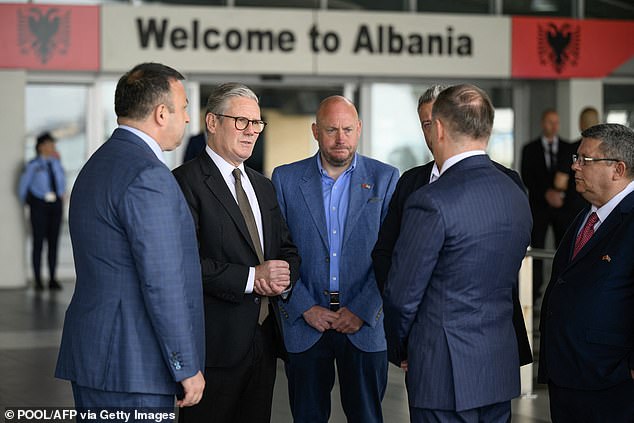
Keir Starmer has announced plans for a Rwanda-style scheme to deport failed asylum seekers to the Balkans.
In a major U-turn, the Prime Minister has authorised talks with a string of Balkan states that would see the UK pay to send failed asylum seekers overseas to so-called ‘return hubs’.
The PM discussed the proposal with his Albanian counterpart Edi Rama during talks in Tirana today.
Other countries involved in negotiations about potential deals include Serbia, Bosnia and North Macedonia.
Speaking in Albania, Sir Keir said: ‘What now we want to do and are having discussions of, talks of, is return hubs which is where someone has been through the system in the UK, they need to be returned and we have to make sure they’re returned effectively and we’ll do that, if we can, through return hubs.
‘So that’s what the talks are about. I would say in this area no single measure is going to be the measure that is, if you like, a silver bullet.
‘By putting it all together – arrests, seizures, agreements with other countries, returning people who shouldn’t be here, and return hubs, if we can through these talks to add to our armoury, will allow us to bear down on this vile trade and to make sure that we stop those people crossing the Channel.’
Downing Street said the plans were ‘entirely different’ to the last government’s flagship Rwanda deportation scheme.

Keir Starmer has authorised talks with a string of Balkan states that would see the UK pay to send failed asylum seekers overseas to so-called ‘return hubs’

The PM discussed the proposal with his Albanian counterpart Edi Rama during talks in Tirana today

Starmer is shown the procedures carried out by search teams as they check vehicles arriving in the ferry port from Italy, in Tirana, Albania
But the decision to open talks on paying to send asylum seekers to third countries will leave the Prime Minister open to charges of hypocrisy.
Sir Keir scrapped the Rwanda scheme within days of coming to office, branding it a ‘gimmick’.
But ministers are now scrambling to find a replacement that could act as a deterrent to Channel migrants following a surge in crossings since Labour came to power.
Arrivals this year have topped 12,000 – an increase of 40 per cent on 2024. More than 600 crossed on Monday while the PM was giving a major speech promising a crackdown on immigration.
The surge in numbers threatens to make a mockery of Labour’s plan to ‘smash the gangs’, with ministers now resorting to blaming the fine weather for the increase in illegal crossings.
The new plan will involve sending paying to send potentially thousands of failed asylum seekers to the Balkans, rather than holding them in the UK until they can be removed.
In some cases, those involved will be from countries like Afghanistan which are deemed too dangerous to return people to.
But officials say many other cases involve people who are ‘actively frustrating’ their removal to relatively safe countries through tactics like destroying their identity documents.

Starmer speaks with a drone operator as he is shown the procedures carried out by search teams
One Whitehall insider described the plan as ‘Rwanda-lite’ but insisted it still had the potential to act as a deterrent and persuade some failed asylum seekers to return home voluntarily rather than gamble on finding a way to stay in the UK.
A government source said: ‘We think this has the potential to be a viable, cost-effective option that meets our international obligations and can reduce the burden of illegal migration on UK shores.’
The source said that removing failed asylum seekers more quickly would ‘reduce opportunities for them to find further reasons in the UK – such as quickly marrying someone, or starting a family, which makes their removal harder’.
Under the last government’s Rwanda scheme, Channel migrants would have been sent directly to Africa, with no opportunity to return to the UK.
The new proposal would target only those who have exhausted the asylum appeals process – a process which can take months or even years.
Ministers are optimistic that the plans will comply with international law. Similar ideas are already being pursued by other EU countries and the UNHCR refugee agency has signalled it does not oppose the idea in principle.
A government source said: ‘Our guiding principle will always be something that is workable and meets international obligations.’






